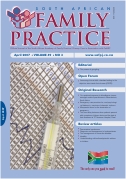Emergency care provision for, and psychological distress in, survivors of domestic violence
Keywords:
Emergency Care, Domestic Violence
Abstract
Background This study aimed (i) to ascertain the number of treatment referrals and information about protection orders given to survivors of domestic violence presenting for emergency trauma care, as reported at the one-month visit, (ii) to obtain a profile of violent incidents and injuries, and (iii) to assess self-esteem and posttraumatic and depressive symptomatology in the aftermath of injury. Methods A survey of 62 participants presenting in the acute aftermath of domestic violence (as defined by the Domestic Violence Act of 1998) was conducted over 12 weeks at the Trauma and Resuscitation Unit of a Level One trauma centre in an urban public hospital in South Africa.1 Following informed consent, face-to-face structured interviews were conducted during admission and a month later. The following instruments were administered at baseline: a Demographic and Injury Questionnaire, the Beck Depression and Rosenberg Self-Esteem Inventories, and the Davidson Trauma Scale. A psychosocial questionnaire was administered at the one-month follow-up. Results Fifty-eight per cent of the participants were female and 42% were male. Seventy-four per cent of the perpetrators were male. Ninety-five per cent of the participants said that no health professional had informed them about where or how they could find help. Although all were seriously injured, 76% of the participants said only the researcher had asked about their experience. Sixty-six per cent of the cases of domestic violence were related to intimate partner violence. Overall, subjects displayed high levels of depressive and post-traumatic stress symptomatology that had neither been treated nor adequately referred. Conclusion Even though domestic violence poses significant health threats and costs to the health system, it appears to be a neglected area of South African health care. Health professionals should at least be able to identify and intervene within the "open window" period when psychosocial opportunities are pivotal.
Published
2007-04-04
Section
Original Research
By submitting manuscripts to SAFP, authors of original articles are assigning copyright to the South African Academy of Family Physicians. Copyright of review articles are assigned to the Publisher, Medpharm Publications (Pty) Ltd, unless otherwise specified. Authors may use their own work after publication without written permission, provided they acknowledge the original source. Individuals and academic institutions may freely copy and distribute articles published in SAFP for educational and research purposes without obtaining permission.

